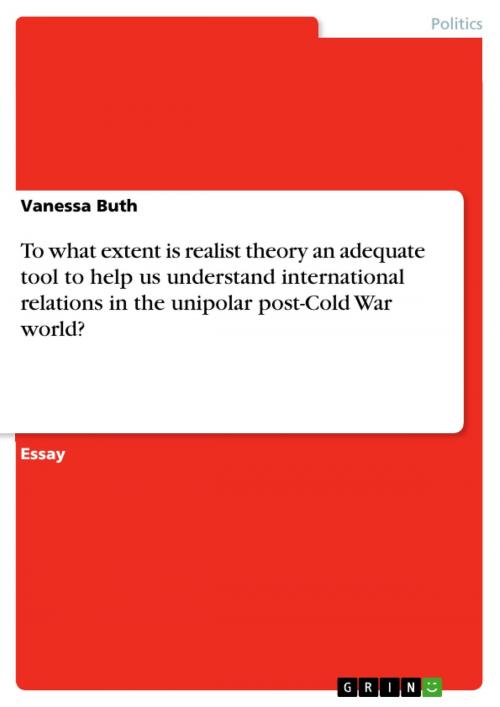To what extent is realist theory an adequate tool to help us understand international relations in the unipolar post-Cold War world?
Nonfiction, Social & Cultural Studies, Political Science, International, International Security| Author: | Vanessa Buth | ISBN: | 9783638580489 |
| Publisher: | GRIN Publishing | Publication: | December 15, 2006 |
| Imprint: | GRIN Publishing | Language: | English |
| Author: | Vanessa Buth |
| ISBN: | 9783638580489 |
| Publisher: | GRIN Publishing |
| Publication: | December 15, 2006 |
| Imprint: | GRIN Publishing |
| Language: | English |
Essay from the year 2006 in the subject Politics - International Politics - Topic: Peace and Conflict Studies, Security, grade: 1,3, University of Bath (Modern Languages and European Studies), course: International Relations and International Security, 17 entries in the bibliography, language: English, abstract: There was going to be a 'new partnership of nations' emphasized president Bush of the United States on the 11th of September 1990, and declared the 'new world order'. With the collapse of the Soviet Union in 1989, the 40 year long Cold War period of a bipolar world divided into the States with its Western allies and the Soviets with its Eastern allies ended. Only one global superpower, the United States, was left. Michael E. Brown (2003: 2) argues the leading powers did not form a new partnership of nations. He regards the international system still as anarchic, referring to international responses to war, slaughter and starvation in Bosnia and Somalia and in Rwanda 1994. Waltz responds that only 'changes of the system' would be able to modify the international political system, but not 'changes in the system' (Waltz 2000: 5). It has been argued that the terrorism attacks in the U.S. of 9/11 2001 have changed the way how the global system works. High Bush administration officials described them as world view changing and world changing. (Crawford, 2004: 685 - 703). What it did was changing the - public - perception of international security. At NBC's 'Meet the Press' on September 14, 2003, Dick Cheney explained that '9/11 changed everything. It changed the way we think about threats to the United States. It changed about our recognition of our vulnerabilities. It changed in terms of the kind of national security strategy we need to pursue.' International Relations theorists have been analysing as well as formulating the foreign policy of states of this new unipolar constellation within the international system. One dominating theory is realism, the 'power politics' school of thought. Its main assumptions are that nation-states are the only important actor in the international system, that states are pursuing power as a means of achieving security and that the international system is anarchic (Carr, Morgenthau, Waltz, Mearsheimer).
Essay from the year 2006 in the subject Politics - International Politics - Topic: Peace and Conflict Studies, Security, grade: 1,3, University of Bath (Modern Languages and European Studies), course: International Relations and International Security, 17 entries in the bibliography, language: English, abstract: There was going to be a 'new partnership of nations' emphasized president Bush of the United States on the 11th of September 1990, and declared the 'new world order'. With the collapse of the Soviet Union in 1989, the 40 year long Cold War period of a bipolar world divided into the States with its Western allies and the Soviets with its Eastern allies ended. Only one global superpower, the United States, was left. Michael E. Brown (2003: 2) argues the leading powers did not form a new partnership of nations. He regards the international system still as anarchic, referring to international responses to war, slaughter and starvation in Bosnia and Somalia and in Rwanda 1994. Waltz responds that only 'changes of the system' would be able to modify the international political system, but not 'changes in the system' (Waltz 2000: 5). It has been argued that the terrorism attacks in the U.S. of 9/11 2001 have changed the way how the global system works. High Bush administration officials described them as world view changing and world changing. (Crawford, 2004: 685 - 703). What it did was changing the - public - perception of international security. At NBC's 'Meet the Press' on September 14, 2003, Dick Cheney explained that '9/11 changed everything. It changed the way we think about threats to the United States. It changed about our recognition of our vulnerabilities. It changed in terms of the kind of national security strategy we need to pursue.' International Relations theorists have been analysing as well as formulating the foreign policy of states of this new unipolar constellation within the international system. One dominating theory is realism, the 'power politics' school of thought. Its main assumptions are that nation-states are the only important actor in the international system, that states are pursuing power as a means of achieving security and that the international system is anarchic (Carr, Morgenthau, Waltz, Mearsheimer).















